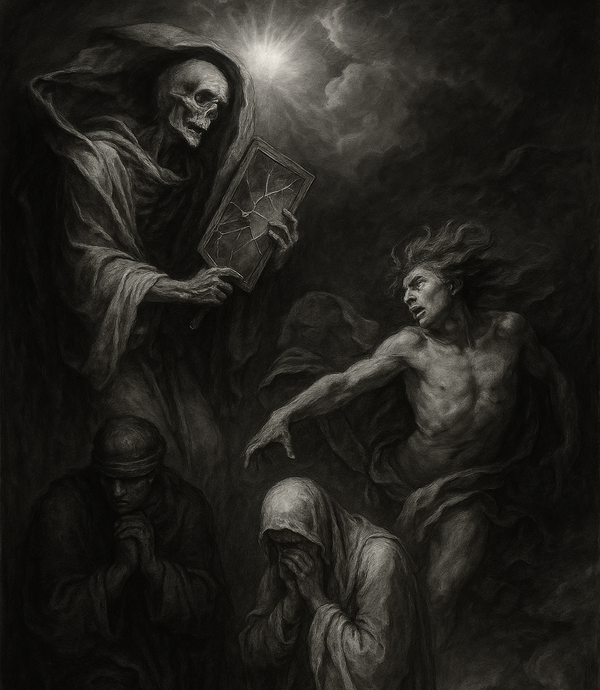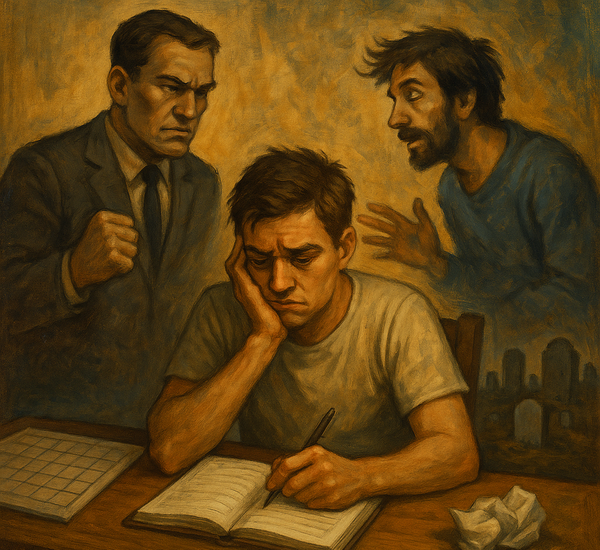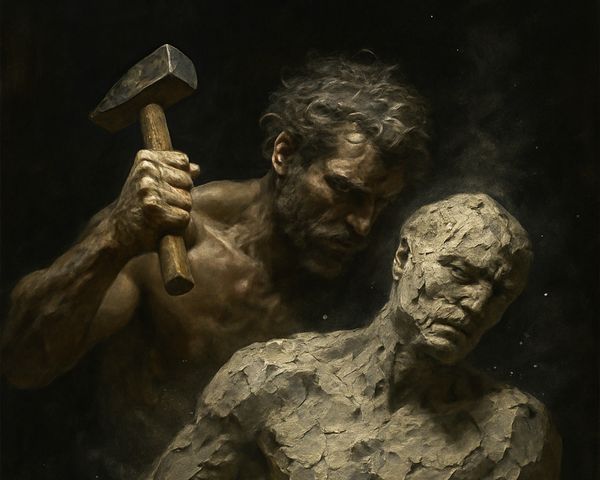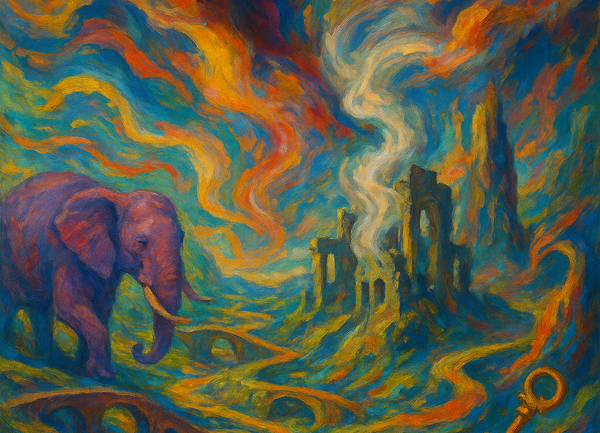The Secret Structure Behind Every Belief System
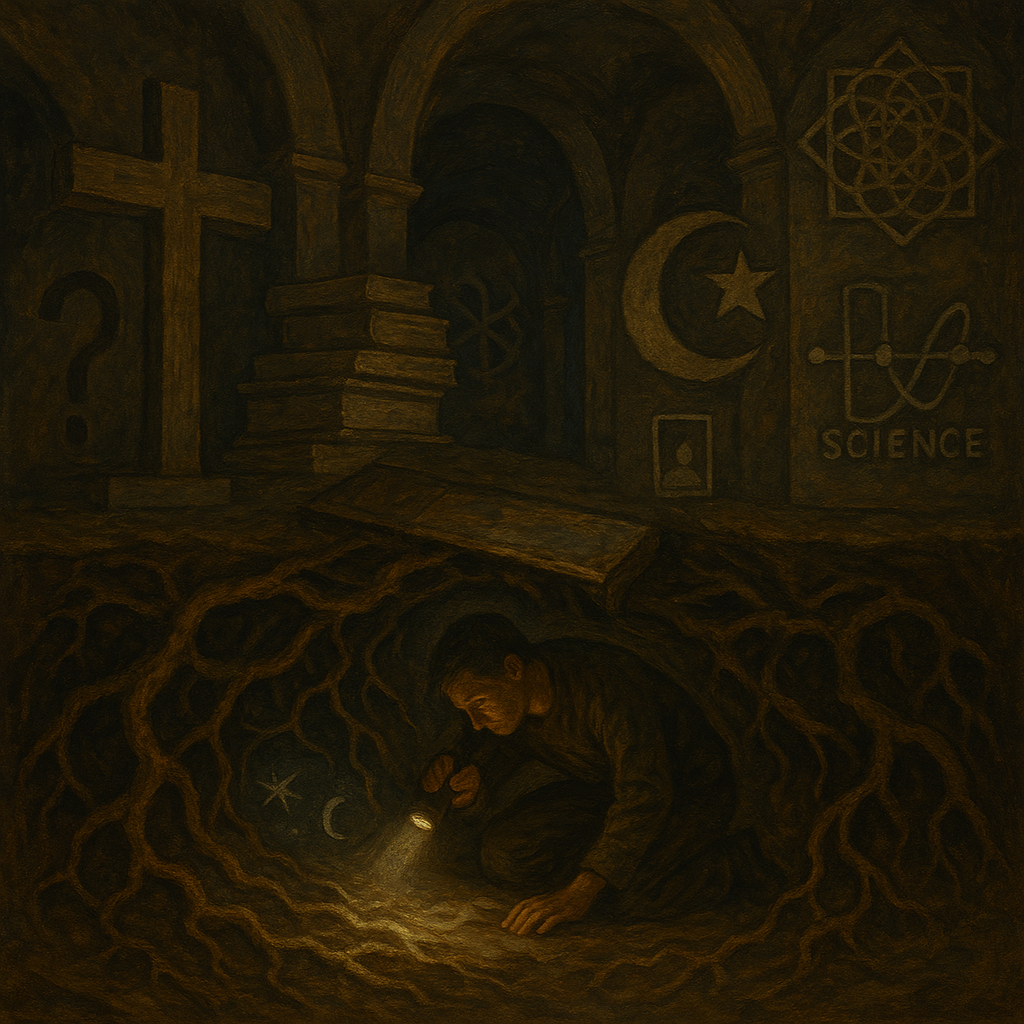
Every human builds the same invisible structure. We just call it different names. Then we argue about whose version is superior - like debating whether to cut with a knife or scissors, while completely missing that we're all just trying to cut something. And we wonder why people are walking away from the whole conversation.
DISCLAIMER: This isn't meant to convert, convince, or condemn. It's just one confused human trying to make sense of the frameworks we all build — whether we call them gods, goals, or "just being logical." If religion is sacred to you, welcome. If it's nonsense to you, also welcome. I'm not here to win. I'm here to think out loud.
The Hidden Pattern Across All Human Meaning-Making
Religious debates miss the point entirely. Everyone's arguing about the wrong thing.
They fight over which beliefs are "true" instead of asking what these systems actually do. But there's a structure running underneath every belief system ever created—and once you see it, you can't unsee it.
Strip away the costumes, the rituals, the thousand-year-old arguments about scripture—and every religion, ideology, and worldview is doing the same thing: giving you a way to make decisions when life gets complicated.
- Christianity puts moral choice at the top: "What would Jesus do?"
- Buddhism puts suffering-reduction at the top: "Does this increase or decrease suffering?"
- Taoism puts balance at the top: "How do opposites define each other?"
- Science puts evidence at the top: "What can be proven?"
- Self-help puts optimization at the top: "What makes me better?"
Each one gives you a filter for every choice you make. A way to organize chaos into meaning. A decision tree with something specific at the top.
And here's the orchestra: they all work like instruments in the same symphony. It's not about picking the right tool - it's about knowing when to bring in the strings, when to add the brass, when to let the piano carry the melody. The goal is cohesion, not competition. But why we do this is a whole other topic (which sounds like a good alternative article)
The Universal Structure: Something Always Sits at the Top
To understand this secret structure, we need to completely redefine God.
Webster says: "The Supreme Being; Jehovah; the eternal and infinite spirit, the creator, and the sovereign of the universe."
Useless. That's not a definition—it's a job description for a cosmic CEO in which half the world doesn't believe. Let's make some fun of it to drive my point:
- It assumes there’s only one god.
(Tell that to the Greeks, who had a god just for wine hangovers.) - It assumes that God is male.
(Jehovah. He. Him. Bro of the cosmos.) That’s a whole bias spiral by itself. - It assumes the universe has a sovereign.
So… monarchy? Who voted for this?
Here's the actual structure: Every belief system puts something at the top of your decision tree. Not what you worship out loud, but what actually shapes your life when no one's watching.
It's your ultimate filter. Your final "because." The voice that either believes in you or watches you spiral.
You have one, even if you're an atheist and even if you've never named it.
-> When you choose career over family, what's driving that choice?
-> When you tell the truth, even when it hurts, what's at the top of that decision?
-> When you stay loyal to someone who's struggling, what system is running that call?
That's your God. The framework you use to filter reality into choices. You may have one. You may have multiple.
Christianity names theirs Jesus. Buddhism names theirs the reduction of suffering. Science names theirs evidence. Productivity culture names theirs optimization.
Most people just never bother to name theirs at all.
The Same Structure Runs Everything (Even Science)
I trust science. But not because I've validated every paper. I trust that someone smarter, somewhere upstream, already did.
That's not logic—that's the same structure religious people use, just with different branding.
I've seen the news misquote scientific papers more times than I've seen a priest misquote scripture. "Trust the science" works great until the science is stripped of context to support someone's narrative. And narratives are power.
The structure of religious faith and scientific faith is identical—it's just the purpose that differs. That's also why we have religious scientists.
Both systems say: "Here's how to make sense of chaos. Here's what to trust when you can't figure it out yourself. Here's your filter for every choice you'll ever make."
Most of us live inside these structures without naming them:
- Self-help is worship of the self
- Science is faith in proof
- Politics is faith in people
- Productivity is faith in progress
- Nationalism is faith in tribes
We're all building the same thing. We just pretend we're not.
Once you see this pattern, everything changes. You stop being a passive listener to whatever random sounds are playing around you, and you become the conductor of your own orchestra.
Different belief systems aren't enemies—they're instruments. Each one designed to handle different parts of life's complexity. Buddhism for suffering, Christianity for moral clarity, science for evidence, Stoicism for resilience.
The magic isn't in picking the "right" one. It's about knowing which instruments to bring in at the right time to create harmony instead of noise. You can borrow the decision tree from any system when the situation calls for it.
Most people spend their whole lives stuck in one section of the orchestra, playing the same instrument over and over, wondering why the music sounds incomplete.
But once you understand the secret structure, you realize you don't have to choose. You can conduct the whole symphony.
Every Framework Gives You a Way to Live with Your Choices
Here's why all these systems provide value: life is fucking complicated.
Every decision comes with its opposite hiding in the glove compartment—joy with guilt, freedom with loss, safety with boredom. No path is clean. You're always choosing what to sacrifice along with what to gain.
Taoism gets this. Yin and yang aren't good and evil—they're co-arising opposites that define each other. Each side holds a dot of the other because even our strongest emotions are powered by their opposites.
You don't hate randomly. You hate liars because you love the truth. You hate injustice because you love fairness. Hate is often love in reverse—a defense mechanism screaming, "This matters to me."
Christianity draws lines between heaven and hell, but I don't see them as afterlife destinations. I see them as the states you live in now. It's an operating system for feeling good about your choices, or maybe a guide towards enlightenment or a good life.
The real use of religion isn't preventing you from choosing "wrong." It's helping you live with the version of yourself you didn't pick. It gives language to the ache of what you lost and a story for why it's still worth pursuing.
The Problem Isn't Belief—It's Getting Attached to Your Tools
Belief systems get dangerous when they stop being tools and start being identities.
That's when people stop asking questions and start issuing commands. The framework becomes a hammer, and everything that looks different becomes a nail.
I've met open-minded believers and dogmatic atheists. The issue isn't the content of belief —getting attached to being right is.
Most people aren't looking for dialogue. They're looking for passengers on their train. And if you don't get on, you must be broken.
But certainty is just fear of improvement wearing a confident mask.
Understanding the Structure Gives You a Choice in Which System to Use
No baby is born afraid of snakes, but most adults flinch at the sight of one. That's inherited wisdom—collective learning compressed into instinct.
That collective learning process might be the closest thing to a universal structure we actually know.
Maybe the point isn't finding THE answer. Maybe it's recognizing that we're all building decision-making systems, and some work better than others for different situations.
When you understand this secret structure, you get more choice in which system you use. You can borrow the decision tree from Buddhism when you're suffering, the one from Christianity when you need moral clarity, the one from science when you need proof.
You don't have to join their clubs. You just have to recognize what they're actually selling: frameworks for making sense of chaos.
That's the secret: Every belief system—religious, scientific, political—uses the same underlying structure. Once you see the pattern, you can choose your tools instead of having the tools decide for you.
I hope this stirred something. You don't have to agree with it—hell, I don't always agree with myself the next day. These posts aren't commandments. They're thinking out loud with a keyboard.
Thanks for riding the spiral. See you next descent.
